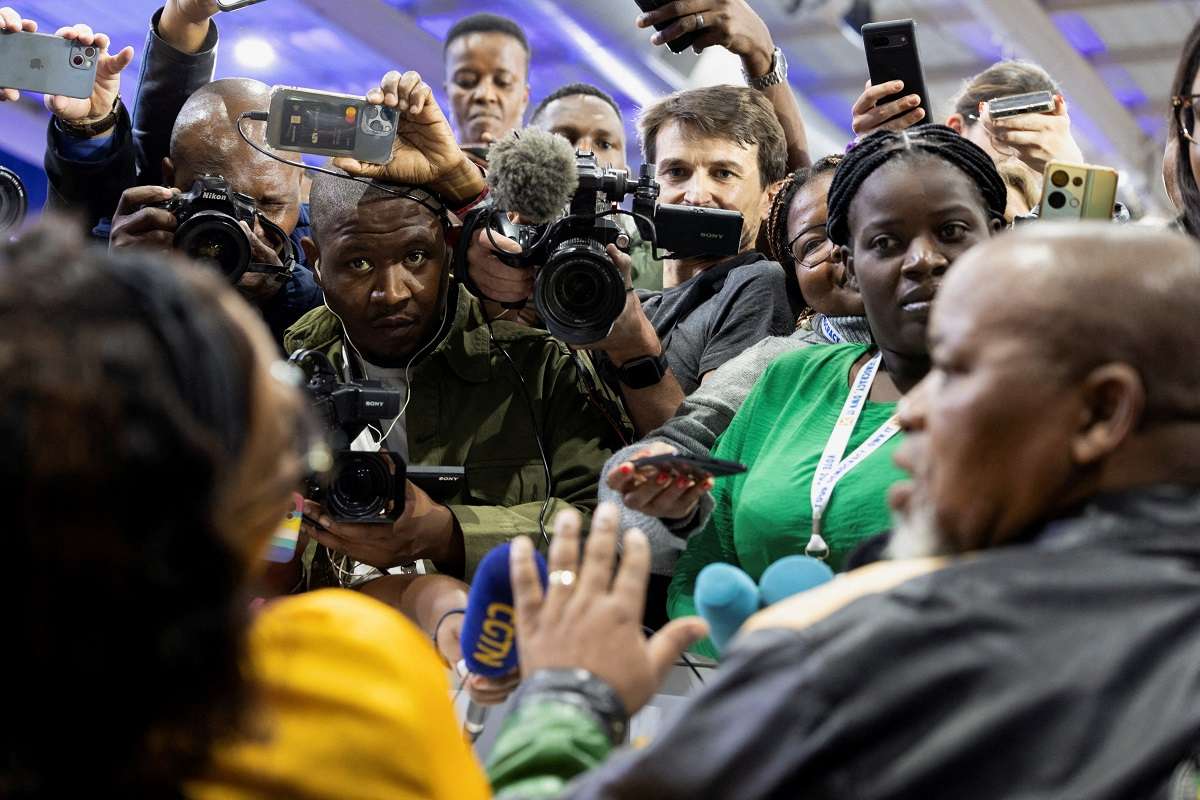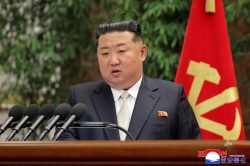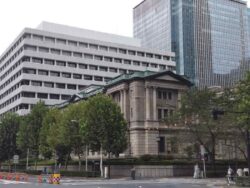
National Chairperson of the African National Congress Gwede Mantashe and Nomvula Paula Mokonyane, Deputy Secretary-General of the African National Congress (ANC) sit at the ANC booth surrounded by media at the result board, at the National Results Operation Centre of the IEC, which serves as an operational hub where results of the national election are displayed, in Midrand, South Africa, June 1, 2024.
17:08 JST, June 2, 2024
JOHANNESBURG (Reuters) – South Africans angry at joblessness, inequality and power shortages slashed support for the African National Congress (ANC) to 40% in this week’s election, ending three decades of dominance by the party that freed the country from apartheid.
A dramatically weakened mandate for the legacy party of Nelson Mandela, down from the 57.5% it garnered in the 2019 parliamentary election, means the ANC must share power with a rival in order to keep it – an unprecedented prospect.
“We can talk to everybody and anybody,” Gwede Mantashe, the ANC chair and current mines and energy minister, told reporters in comments carried by the South African Broadcasting Corporation, dodging a question about who the party was discussing a possible coalition deal with.
Counting from Wednesday’s poll was almost complete on Saturday, with results from 99.87% of polling stations giving the ANC 40.19% of votes.
The ANC had won every national election by a landslide since the historic 1994 vote that ended white minority rule, but over the last decade its support has dwindled as the economy stagnated, unemployment rose and roads and power stations crumbled.
The main opposition party, the Democratic Alliance (DA), had 21.80% support while uMkhonto we Sizwe (MK), a new party led by former President Jacob Zuma, managed to grab 14.58%. The far-left Economic Freedom Fighters (EFF), led by former ANC youth leader Julius Malema, got 9.5%.
Despite doing better than almost anyone expected, MK said it was considering challenging the results in court.
“We want a total revote,” MK spokesperson Nhlamulo Ndhlela said at the results center, minutes before an electoral commission news conference was due to start.
Ndhlela said MK had evidence that the election commission’s system was rigged, without producing any.
Analysts have long feared Zuma’s party may stir up trouble if his supporters – who rioted and looted for days when he was arrested for contempt of court in 2021 – reject the results.
MK’s strong performance, especially in Zuma’s home province of KwaZulu-Natal, is one of the main reasons the ANC failed to secure a majority.
Commenting on some parties’ claims of vote-counting inconsistencies, electoral commission chair Mosotho Moepya earlier said “every concern raised in these objections will be considered and we will do so carefully.”
Asked after MK’s claims whether the commission felt under siege, Moepya said: “We are determined to discharge our obligation as required by the constitution.”
He added election officials would be ready to announce the final results on Sunday as planned.
COALITION SCENARIOS
EFF leader Malema accepted the outcome of the election and said he was willing to talk to his former political home about a coalition deal.
“We have achieved our mission: … to bring the ANC below 50%. We want to humble the ANC,” Malema told journalists.
“We are going to negotiate with the ANC,” he said, although an ANC-EFF coalition would not be quite enough to clinch a majority without including another party, based on the latest count.
Analysts say rather than a formal coalition among a few – an arrangement similar the one set up after 1994’s historic all-race vote – another option for the ANC could be a “government of national unity” involving a broad spectrum of many parties.
Investors in Africa’s most industrialized economy will hope the uncertain picture can quickly become clear and that the country avoids an extended period of wrangling between the main political players.
ANC First Deputy Secretary-General Nomvula Mokonyane meanwhile urged voters and communities to remain peaceful.
Despite the ANC’s result, President Cyril Ramaphosa could still keep his job, as the former liberation movement was on course to get about twice as many votes as the next party. But he will be weakened and could face calls to quit both from opposition parties and critics in the deeply divided ANC.
On Friday Mokonyane backed him to stay on as party leader, and analysts say he has no obvious successor.
A deal to keep the ANC in the presidency could involve opposition backing in exchange for either cabinet posts or more control of parliament, perhaps even the speaker role.
Malema said one of the positions the EFF was going to demand was speaker.
Top Articles in News Services
-

Survey Shows False Election Info Perceived as True
-

Hong Kong Ex-Publisher Jimmy Lai’s Sentence Raises International Outcry as China Defends It
-

Japan’s Nikkei Stock Average Touches 58,000 as Yen, Jgbs Rally on Election Fallout (UPDATE 1)
-

Japan’s Nikkei Stock Average Falls as US-Iran Tensions Unsettle Investors (UPDATE 1)
-

Japan’s Nikkei Stock Average Rises on Tech Rally and Takaichi’s Spending Hopes (UPDATE 1)
JN ACCESS RANKING
-

Producer Behind Pop Group XG Arrested for Cocaine Possession
-

Japan PM Takaichi’s Cabinet Resigns en Masse
-

Man Infected with Measles Reportedly Dined at Restaurant in Tokyo Station
-

Israeli Ambassador to Japan Speaks about Japan’s Role in the Reconstruction of Gaza
-

Videos Plagiarized, Reposted with False Subtitles Claiming ‘Ryukyu Belongs to China’; Anti-China False Information Also Posted in Japan

























